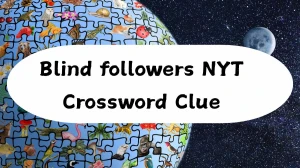Blind Followers: An Insight from The New York Times

Introduction
The concept of ‘blind followers’ has gained significant traction in contemporary discussions about societal behaviour, particularly in relation to media influence and political dynamics. The term refers to individuals who unconditionally align with particular leaders, ideologies, or narratives without critical assessment. Recently, The New York Times highlighted this phenomenon, shining a light on its implications within modern society.
Understanding Blind Followers
In an era where information is abundant yet polarised, the tendency to follow figures without question raises concerns about accountability and informed decision-making. The New York Times has addressed this issue through various articles, focusing on the psychological and social factors that contribute to the rise of blind followers. According to experts quoted in these pieces, conformity and fear of exclusion often drive individuals to align with popular opinions, even when these diverge from their personal beliefs or ethical standards.
Recent Events
Recent events have underscored the significance of this topic. During the global pandemic, for example, blind adherence to conflicting health guidelines or political interpretations has created divisions in society, leading to public protests and sometimes violent confrontations. Op-eds in The New York Times have argued that this growing faction of uncritical followers poses not only a risk to democratic values but also to public health and safety.
The Role of Social Media
Social media platforms have exacerbated the issue, as algorithms often amplify extreme viewpoints, encouraging users to engage with content that reinforces their existing beliefs. The New York Times’ analysis points out that echo chambers and misinformation campaigns significantly contribute to the formation of blind followers. As people become more isolated in their views, constructive dialogue diminishes, leaving a fragmented society struggling with consensus.
Conclusion
As highlighted in The New York Times, the phenomenon of blind followers is not merely a political or social curiosity; it has considerable ramifications for democracy and societal cohesion. Moving forward, fostering critical thinking and encouraging open dialogue are essential steps we must take to navigate these challenges. By promoting an informed citizenry, society can mitigate the risks posed by blind followers, paving the way for more inclusive and informed decision-making processes. Ultimately, recognising and understanding this trend allows readers to reflect on their own beliefs and the sources they trust, ensuring a healthier public discourse.









